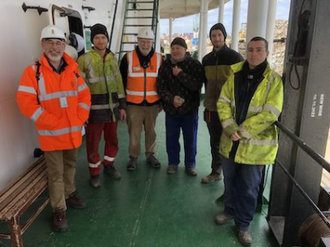News from home takes its toll on Ukrainian seafarers

Charles and Gregory on ship visit
Source: Stella Maris
Seafarer charity Stella Maris is warning that Ukrainian seafarers are experiencing increased levels of loneliness and depression amid fears of conscription if they return home as the war enters its third year.
Stella Maris regional port chaplains for Southampton and Southern ports, Charles Stuart and Gregory Hogan, who make multiple daily ship visits report Ukrainian seafarers are under increasing strain.
"The initial stresses have been replaced by something else," Gregory says. "At first there was the shock of the invasion for Ukrainians and real worry about whether family and friends could get out of dangerous areas.
'Now there is dealing with the compounded pressure of more than two years of war. It is a deeply depressing and worrying situation with no end in sight. In addition, there is the very real fear of being conscripted into the army if they return home."
He said that improved WiFi access can create more anxiety and feelings of helplessness when seafarers access media and war reports.
"I met a captain who came in and then started crying," Hogan says, "His mother in law was in one of the areas being bombed and he hadn't heard from her, yet he was also having to take charge of his ship. We see that many of the seafarers can be exhausted. They can access so much information online now, more than ever before, and have access to distressing often graphic news reports.
"But while they can access the latest news, they feel powerless to do anything about it. The ability to stay in touch can also lead to anxiety. We have seen seafarers deeply distressed because they haven't heard from their wife or partner or parents in 24 hours. They might worry about this all night and then have to work the next morning in an exhausting role."
Gregory further reports growing fears of conscription among the younger generation of seafarers.
"We speak to many who feel they have no option but to keep working," he reveals. "They feel they cannot return to Ukraine for fear of being conscripted yet some still have relatives in Ukraine, who they dearly want to visit, but again there is that fear of conscription should they go back. They have no option but to work continually in a challenging, often lonely role."
Charles, meanwhile, said that the need to keep working and being confined to ship for lengthy periods is taking a huge toll.
"We regularly meet seafarers who may not be able to go ashore for many weeks or even months, which is harmful to their mental health and wellbeing, especially if they have signed a contract to work on board for nine months at a time," he said. "We must all as an industry the seafarer charities, ship operators and captains try and tackle this pattern. We learned from covid spending long periods on ships is just not healthy. Shore leave is essential. And having someone independent from the ship to talk to in confidence, like Stella Maris, is equally vital."
Gregory recounted the story of a crew member who he sat down with during lunch.
"I knew he could only have an hour at most," he recalls. "I kept asking, should I go, I am imposing. And he said 'no, I can eat this in 30 seconds. I am enjoying having someone different to talk to."
The chaplains said many ships visiting UK ports are still operating both Russian and Ukrainian crew, with no option but to work as a team.
"A common response is 'we are seafarers, we conduct ourselves properly. We don't let world events impact our working relationships," Charles says. "Still it's not ideal for the mental health of the crew when there is so much tension already about the conflict. And there are rules against talking about the war which can bottle feelings up."
Gregory adds there are no winners as the conflict continues, with Russian crew members facing challenges too.
"The Russian crews can have concerns about the war and fear speaking out," he says. "One captain took me aside and on his computer showed me how his pension had been destroyed, and he blamed Putin. He was incredibly angry that the savings on which his parents' healthcare relied had been wiped out."
Stella Maris, (formerly known as Apostleship of the Sea), is a registered UK charity. It relies on voluntary donations to continue its work. 90% of world trade is transported by ship. However, the life of a seafarer can be dangerous and lonely. Seafarers may spend up to a year at a time away from home, separated from their families and loved ones, often working in harsh conditions.
Stella Maris' chaplains and ship visitors provide seafarers and fishers with pastoral and practical support, information and a listening ear.
For more information visit: www.stellamaris.org.uk
Facebook: www.facebook.com/StellaMarisOrg
Twitter: @StellaMarisOrg
Instagram: www.instagram.com/stellamaris_uk/


















